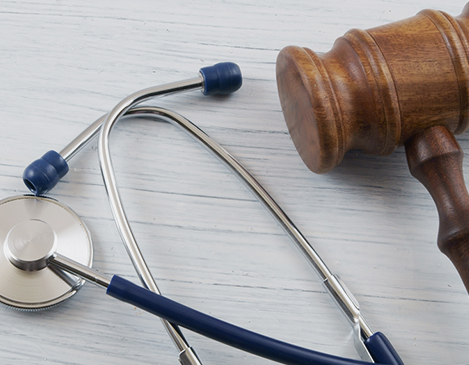When something goes unexpectedly wrong in the medical context, this may lay
claim to an action in tort if medical negligence can be identified. The basis of
such an action lies in the general civil law of negligence, designed to provide
compensation for any individual injured by another’s negligence.
A legal proceeding against the negligent medical practitioner or institution not
only benefits the unfortunate patient but may in fact improve societal
conditions in general.

Such functions of the tort include:
1. Ensuring that the patient who has suffered as a result of medical negligence
receives compensation for his losses;
2. Holding the medical professional accountable for their negligence; and
3. Serving a public statement of the wrong doing so that such mistakes can be
avoided and deterred in the future.
If you believe you have a case against a doctor / medical institution, please do
not hesitate to seek legal advice as early as possible to discuss your options.
This is true even if you have already lodged a complaint with the Singapore
Medical Council (“SMC”). It may be too late to commence a civil claim if you
choose to wait for the SMC investigative report to be released before seeking
legal advice, as there is generally a 3-year limitation period for medical
negligence claims in Court.
A medical negligence claim is intended to reimburse a patient for losses.
The amount calculated is based on the damage or loss suffered. The aim of
the compensation is to restore the claimant back to the position he was in
before the negligent act of the doctor or hospital was committed.
Compensation payable to you may include:
With close to 30 years of experience handling medical negligence claims just like yours, Hoh Law Corporation is well positioned to :
A large number of medical malpractice lawsuits stem from the misdiagnosis or delayed diagnosis of a medical condition, illness, or injury. When a doctor’s diagnosis error leads to incorrect treatment, delayed treatment, or no treatment at all, a patient’s condition can worsen or in extreme cases, lead to fatality.
A misdiagnosis or delayed diagnosis itself is not evidence of negligence.
Skillful doctors can and do make diagnostic errors even when using reasonable
care. The key is determining whether the doctor acted competently, which
involves an evaluation of what the doctor did and did not do in arriving at a
diagnosis.
In a medical malpractice case based on a diagnostic error, the patient must
prove that a doctor in a similar specialty, under similar circumstances, would
not have similarly misdiagnosed the patient’s illness or condition.
Sometimes, a doctor may fail to correctly diagnosis a condition because they relied on inaccurate results from laboratory tests, radiology films, or other types of tests. This can happen in one of two ways:
In these instances, the perpetrator of the human error or the hospital
supplying the facilities may be the one liable for medical negligence.
Again, the patient must prove that the error was the result of negligence.
The patient must also prove that the doctor’s negligent misdiagnosis or
delayed diagnosis caused regression of the patient’s injury or condition.
In the rare case that a doctor misdiagnoses a patient with a condition or
illness that the patient does not have, the patient may also be able to
prove harm in the form of anxiety, stress, medical problems, and expenses
due to unnecessary treatment and other associated claims.
Mistakes in drug prescriptions can be a form of medical negligence.
The effect of a prescription drug error can range from minimal to fatal, depending on the nature of the error.
Types of Prescription Drug Errors:
If you believe that you have been a victim of a prescription drug error and have suffered harm as a result, you should contact us as soon as possible.

Medical horror stories involving surgeries have dotted the landscape across the world. In some pretty astonishing cases, the negligent acts of doctors performing surgery have caused much pain and suffering, and even deaths, to their patients.
In one such case (in the United Kingdom), the patient and her baby passed on after a surgical team removed the wrong organ from the mother.

Negligence as a tort requires more than mere lack of care. A claimant who wishes to sue in negligence must show:
The biggest mistake a patient can make is waiting too long to file a claim. Legal time limits require patients to file legal claims promptly. If you believe you have a case against a doctor / medical institution, contact us as early as possible to discuss your options. Please do not hesitate to seek legal advice even if you have lodged a complaint with the Singapore Medical Council (“SMC”). It may be too late to commence a civil claim if you choose to wait for the SMC investigative report to be released before seeking legal advice, as there is a limitation period for all negligence cases.
This is a crucial determination. Just because medical negligence has
occurred at a hospital or clinic, does not necessarily mean that the
facility can be held responsible. If your case is based on
sub-standard care provided by an individual doctor, and that doctor
is an independent contractor (as opposed to an employee of the
hospital), you need to pursue a direct action against the doctor
personally.
A case against the hospital will only be available if the doctor was
an employee of the hospital or if the doctor’s incompetence should
have been obvious to the hospital. To find out who to commence an
action against, please do not hesitate to contact us.
A hospital must keep every patient’s medical records for at least 7 years after treatment. Upon request and payment of the applicable fees, the hospital must disclose copies of the records to the patient. Upon obtaining your written consent, your lawyers may also write to the relevant medical institution to make a request on your behalf.
Patients will have to overcome several legal hurdles before the filing of a lawsuit. A patient might have to file an affidavit in which a qualified medical expert attests that the plaintiff has a valid case. A patient might also have to submit a claim to a medical review board before filing a law suit, or attend mediation sessions as a form of alternative dispute resolution. These complex procedures require the experience of qualified lawyers to guide you through the process.
Thank you for choosing HOH Law Corporation. For any general enquiries, please fill in the following contact form and we will get back to you as soon as possible. Alternatively, you may reach us at 6553 4800.